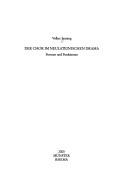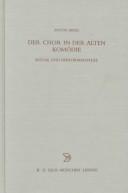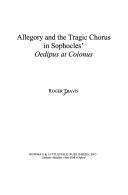| Listing 1 - 10 of 24 | << page >> |
Sort by
|

ISBN: 3930454548 Year: 2005 Publisher: Münster Rhema
Abstract | Keywords | Export | Availability | Bookmark
 Loading...
Loading...Choose an application
- Reference Manager
- EndNote
- RefWorks (Direct export to RefWorks)
Drama --- Neo-Latin literature --- Latin drama, Medieval and modern --- Chorus (Drama) --- Chorus --- History and criticism
Book
ISBN: 9780198844532 0198844530 0191880027 0192582887 Year: 2020 Publisher: Oxford Oxford University Press
Abstract | Keywords | Export | Availability | Bookmark
 Loading...
Loading...Choose an application
- Reference Manager
- EndNote
- RefWorks (Direct export to RefWorks)
"The Chorus of Drama in the Fourth Century BCE seeks to upend conventional thinking about the development of drama from the fifth to the fourth centuries and to provide a new way of talking and thinking about the choruses of drama after the deaths of Euripides and Sophocles. Set in the context of a theatre industry extending far beyond the confines of the City Dionysia and the city of Athens, the identity of choral performers and the significance of their contribution to the shape and meaning of drama in the later Classical period (c.400-323) as a whole is an intriguing and under-explored area of enquiry. This volume draws together the fourth-century historical, material, dramatic, literary, and philosophical sources that attest to the activity and quality of dramatic choruses and, having considered the positive evidence for dramatic choral activity, provides a radical rethinking of two oft-cited yet ill-understood phenomena that have traditionally supported the idea that the chorus of drama 'declined' in the fourth century: the inscription of r *u~ ' *s in papyri and manuscripts in place of fully written-out choral odes, and Aristotle's invocation of embolima (Poetics 1456a25-32). It also explores the important role of influential fourth-century authors such as Plato, Demosthenes, and Xenophon, as well as artistic representations of choruses on fourth-century monuments, in shaping later scholars' understanding of the dramatic chorus throughout the Classical period, reaching conclusions that have significant implications for the broader story we wish to tell about Attic drama and its most enigmatic and fundamental element, the chorus"--
Theatrical science --- Drama --- Classical Greek literature --- Antiquity --- Theater --- Chorus (Drama) --- Greek drama --- Chorus (Greek drama) --- History --- Chorus
Book
ISBN: 1139889680 1107065593 1107054877 1107055946 1107059518 1107058171 1139519565 9781107055940 9781139519564 9781107058170 9781107033283 1107033284 9781139889681 9781107065598 9781107054875 9781107059511 1316613569 Year: 2013 Publisher: New York
Abstract | Keywords | Export | Availability | Bookmark
 Loading...
Loading...Choose an application
- Reference Manager
- EndNote
- RefWorks (Direct export to RefWorks)
This volume explores how the choruses of Greek tragedy creatively combined media and discourses to generate their own specific forms of meaning. The contributors analyse choruses as fictional, religious and civic performers; as combinations of text, song and dance; and as objects of reflection in themselves, in relation and contrast to the choruses of comedy and melic poetry. Drawing on earlier analyses of the social context of Greek drama, the non-textual dimensions of tragedy, and the relations between dramatic and melic choruses, the chapters explore the uses of various analytic tools in allowing us better to capture the specificity of the tragic chorus. Special attention is given to the physicality of choral dancing, musical interactions between choruses and actors, the trajectories of reception, and the treatment of time and space in the odes.
Drama --- Greek drama (Tragedy) --- Chorus (Drama) --- Greek drama --- Chorus (Greek drama) --- History and criticism. --- Chorus --- Arts and Humanities --- History

ISBN: 3598776756 3111841944 3110956713 Year: 2001 Publisher: München Leipzig K.G. Saur
Abstract | Keywords | Export | Availability | Bookmark
 Loading...
Loading...Choose an application
- Reference Manager
- EndNote
- RefWorks (Direct export to RefWorks)
Aristophanes [Comicus] --- Greek drama (Comedy) --- Drama --- Dionysus (Greek deity) in literature. --- Phallicism in literature. --- History and criticism. --- Chorus (Greek drama) --- Aristophanes. --- Chorus (Drama) --- Greek drama --- Chorus

ISBN: 084769609X 0847696081 Year: 1999 Publisher: Totowa Rowman & Littlefield
Abstract | Keywords | Export | Availability | Bookmark
 Loading...
Loading...Choose an application
- Reference Manager
- EndNote
- RefWorks (Direct export to RefWorks)
Allegory. --- Drama --- Oedipus (Greek mythology) in literature. --- Tragedy. --- Chorus (Greek drama) --- Sophocles. --- Chorus (Greek drama). --- Allegory --- Oedipus (Greek mythology) in literature --- Tragedy --- Chorus (Drama) --- Greek drama --- Personification in literature --- Symbolism in literature --- Chorus
Book
ISBN: 3484660309 9783484660304 3110918692 Year: 1999 Volume: 30 Publisher: Tübingen: Max Niemeyer,
Abstract | Keywords | Export | Availability | Bookmark
 Loading...
Loading...Choose an application
- Reference Manager
- EndNote
- RefWorks (Direct export to RefWorks)
Der Chor war zentrales Element des antiken Theaters. In der Neuzeit stellte er für Dichter, Theatermacher und Publikum meist ein großes Hindernis bei der Rezeption antiker Stücke dar. Im Sprechtheater des 20. Jahrhunderts fand dieses fremde Theatermittel jedoch verstärkte Aufmerksamkeit. In der vorliegenden Arbeit werden Probleme und Chancen des Chorgebrauchs in der Theaterpraxis des 20. Jahrhunderts erörtert. Ausgehend von einer formalen Definition des Chores in der griechischen Tragödie und Komödie und nach einem Überblick über den Umgang mit dem Chor im Theater der Neuzeit, wird in acht Kapiteln, in deren Mitte jeweils eine Inszenierung oder ein Drama stehen, eine Typologie des Theaterchores im zu Ende gehenden Jahrhundert entworfen - im Zentrum steht dabei das deutsche Theater. So behandelt der Autor am Beispiel Max Reinhardts den inzwischen höchst problematischen Massenchor, anhand von Vsevolod Meyerholds Inszenierung von Gogols »Revisor« erörtert er den komischen Chor, Peter Weiss' »Marat/Sade«-Drama wird als wichtiges Beispiel für einen spielerisch eingesetzten Chor verstanden. Im Theater der Gegenwart spielen, so die Beobachtung, der Chor bzw. chorische Formen bei Frank Castorf, Einar Schleef oder Christoph Marthaler eine zentrale und doch jeweils ganz unterschiedliche Rolle. Insgesamt zeigt sich, daß der Chor ein lebendiges, gegenwärtiges Theater auf vielfältige Weise zu bereichern vermag. Dabei stellen gelungene Chöre in Antikeninszenierungen weiterhin eher die Ausnahme dar. Gerade im Theater der 90er Jahre, beginnend jedoch schon bei Brechts flexiblem Umgang mit dem Chor, gibt es vielfältige Chorformen, die inhaltlich häufig in keiner Verbindung zur Antike mehr stehen.
Directing --- 82-2 "19" --- Toneel. Drama--20e eeuw. Periode 1900-1999 --- Drama. --- Inszenierung. --- Chor. --- Chor --- Drama --- Theater --- Varia --- Sprechtheater - Theorie --- Dramaturgie --- Inszenierung, Regie --- Geschichte --- History --- Chorus. --- 20. Jahrhundert --- 20. Jahrhundert (- 1945) --- Geschichte 1910-1995. --- Deutschland. --- Deutschland --- Inszenierung --- Varia. --- Sprechtheater - Theorie. --- Dramaturgie. --- Inszenierung, Regie. --- 20. Jahrhundert. --- 20. Jahrhundert (- 1945). --- 82-2 "19" Toneel. Drama--20e eeuw. Periode 1900-1999 --- History and criticism. --- Chorus (Drama)

ISBN: 3519074591 3519074699 Year: 1990 Volume: 10,20 Publisher: Stuttgart B.G. Teubner
Abstract | Keywords | Export | Availability | Bookmark
 Loading...
Loading...Choose an application
- Reference Manager
- EndNote
- RefWorks (Direct export to RefWorks)
875 EURIPIDES --- Drama --- -Rhetoric, Ancient --- Tragedy --- Classical languages --- Greek language --- Greek rhetoric --- Latin language --- Latin rhetoric --- Drama, Modern --- Plays --- Stage --- Literature --- Acting --- Dialogue --- Griekse literatuur--EURIPIDES --- Chorus (Greek drama) --- Rhetoric --- Philosophy --- Euripides --- -Technique --- 875 EURIPIDES Griekse literatuur--EURIPIDES --- -Euripides --- Euripide --- Technique --- Ancient rhetoric --- Rhetoric, Ancient. --- Technique. --- Chorus (Drama) --- Greek drama --- Chorus --- Rhetoric, Ancient
Book
ISBN: 9789004165144 9004165142 9786613060662 904743286X 1283060663 9789047432869 Year: 2008 Volume: 292 Publisher: Boston Brill
Abstract | Keywords | Export | Availability | Bookmark
 Loading...
Loading...Choose an application
- Reference Manager
- EndNote
- RefWorks (Direct export to RefWorks)
Dance of Words argues for a fundamental difference in the modes of expression of actor and chorus. The chorus views the action from the perspective of dancers and singers, while the actors' understanding is shaped by the responsibility they have to make things happen. While this responsibility fashions the actors' considerations of cause and effect, linear movement through time and space, and a sense of history, the chorus' sensibilities arise out of the rhythms of its song and movements. Its mode of expression is a particular way of communicating and elaborating on man's place in the larger order, and its view of the action is bounded by the way that song and dance mirror that order.
Drama --- Théâtre (Genre littéraire) --- Chorus (Greek drama) --- Choeur de théâtre grec --- Sophocles. --- Sophocles --- Drama -- Chorus (Greek drama). --- Sophocles. Antigone. --- Sophocles. Philoctetes. --- Languages & Literatures --- Greek & Latin Languages & Literatures --- Chorus (Greek drama). --- Théâtre (Genre littéraire) --- Choeur de théâtre grec --- Chorus (Drama) --- Greek drama --- Chorus --- Carter, Elliott, --- Drama - Chorus (Greek drama) --- Sophocles - Antigone --- Sophocles - Philoctetes
Book
ISBN: 3519074842 Year: 1993 Volume: 35 Publisher: Stuttgart B.G. Teubner
Abstract | Keywords | Export | Availability | Bookmark
 Loading...
Loading...Choose an application
- Reference Manager
- EndNote
- RefWorks (Direct export to RefWorks)
Agamemnon (Greek mythology) in literature --- Drama --- -Tragedy --- Drama, Modern --- Plays --- Stage --- Literature --- Acting --- Dialogue --- Chorus (Greek drama) --- Philosophy --- Aeschylus. --- Eskhil --- Eschylus --- Aischylos --- Esquilo --- Eschilo --- Aiskhilos --- Eshil --- Æskílos --- Ajschylos --- Eschil --- Eschyle --- Äschylos --- Eskili --- Aiszkhülosz --- Eschylos --- Iskilos --- Эсхил --- אייסכילוס --- איסכילאס --- איסכילוס --- إيسخولوس --- ايسخيلوس --- Αἰσχύλος --- Tragedy --- Chorus (Drama) --- Greek drama --- Chorus
Book
ISBN: 3519075539 3598775547 Year: 1996 Publisher: Stuttgart : Teubner,
Abstract | Keywords | Export | Availability | Bookmark
 Loading...
Loading...Choose an application
- Reference Manager
- EndNote
- RefWorks (Direct export to RefWorks)
Dance --- Dionysus (Greek deity) in literature. --- Drama --- Greek drama (Tragedy) --- History. --- Chorus (Greek drama) --- History and criticism. --- -Dionysus (Greek deity) in literature --- -Greek drama (Tragedy) --- -Drama --- Drama, Modern --- Plays --- Stage --- Literature --- Acting --- Dialogue --- Dances --- Dancing --- Amusements --- Performing arts --- Balls (Parties) --- Eurythmics --- History --- History and criticism --- Philosophy --- -History --- Chorus (Greek drama). --- -Dances --- Dionysus (Greek deity) in literature --- Chorus (Drama) --- Greek drama --- Chorus
| Listing 1 - 10 of 24 | << page >> |
Sort by
|

 Search
Search Feedback
Feedback About UniCat
About UniCat  Help
Help News
News